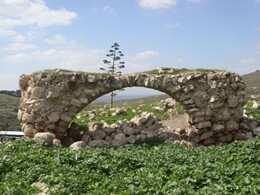Dheisheh refugee camp, West Bank 5 July 2008

Deir Rafat (Areej Ja’fari)
From that day I started my new life. I was very scared at the beginning as I approached the Israeli soldiers at the checkpoints even though I had a permit to enter Jerusalem. These feelings of fear vanished the moment I reached some of the destroyed villages of my friends’ families and neighbors. Driving from the Dheisheh refugee camp, crossing the checkpoint and entering the land we were dispossessed of 1948, is like I am in a different country. The green trees, fresh air, no houses, and beautiful landscape that I have not seen in many countries I have visited around the world.
I felt a change inside me when my companions and I saw the Deir Rafat sign on the left side of the road. I could feel my heart racing. I could not wait anymore, I wanted to jump from the car and stand on the land. I wanted to scream so that everyone on this earth could hear me, “This is my village. I am from here!”
Now, I see everything like a movie playing repeatedly in my head over and over again. It is like a painted mural in front of me. I could not believe that this was my village. The pictures that I have drawn in my head from my grandfather stories are nothing compared to the beautiful scenes I was observing with my own eyes.
When I left the car and walked inside the monastery, I got a feeling I never had before, a feeling when your heart is empty and something is filling it. I did not know exactly what this feeling was until now! I didn’t feel that two eyes were enough for me at that moment. I needed and wanted more so I can see the whole village at once. We went down the valley behind the monastery. We saw a destroyed well; the village had nine wells as my grandfather told me. It was heartbreaking when I saw the well was a garbage dump — it should be beautiful and clean with water for drinking.
We continued by car to see olive groves and cacti on both sides of the small roads. Cacti and olives trees are signs of life and inhabitants in that area. We proceeded a bit further, walking and saw some Bedouin tents and their livestock. We climbed a little bit of the hill and some ruins of the village emerged. We saw part of a destroyed house. My heart was filled with strange feelings and my mind was going back and forth between Deir Rafat and Dheisheh. Why can’t my family and I live here in Deir Rafat peacefully? Why can’t my grandfather come back to his land to planet his olive trees as he used to do with his father before 18 July 1948?
I laid down on one of the ruined walls of a house and kept watching the clear blue sky. At that moment I felt the sky was very close and I wanted to hide in it to stay in Deir Rafat. As the clouds passed over, I kept breathing the air again and again as if I could not have enough of it.
I collected some flowers and za’atar baladi. We drove past the well to the other side of the village, with more of the olive trees on both sides of the road and saw a Bedouin tent. A woman there invited us to enter, she knew some of my relatives, and she also told us that they pay 2,000 shekels (about 6,000 USD) every 20 days to the Beit Shemesh Municipality for the tent they live in. I would pay anything and everything to live there, where I should be living. Instead, I am living in a zoo and struggling for my basic rights.
I planted three flowers that I brought with me from Bethlehem near the well. One was for my great-grandfather, the other for my grandfather, and the last one for my family. My village is already beautiful and my flowers will not add to it. Nor did plant them because I will return after 20 years to claim ownership of the land where I planted the flowers. I own the land now and I owned it then, I do not need any evidence. I planted them as a gift to the land I loved even before we met and as my guide to the light at the end of the tunnel. I hope my land liked the gift.
It is time to wake up from this dream, time to return to the Dheisheh refugee camp, which I like, but to which I don’t feel a sense of belonging. It is time to face my family, they were all anxious to know how home looked like, where exactly did I go. I couldn’t reply more than that it’s the most beautiful place I have ever seen.
But I got frustrated after all that joy, my mother wanted so much to also go and see the village. I still cannot go see my grandfather, who has a lot of memories in Deir Rafat: of his childhood, his house, his mother’s grave and his youth. Yet, he cannot go there to visit and I can. It is an unfair world.
Areej Jafari is origionally from the village of Deir Rafat and was born and raised in Dheisheh refugee camp. She holds a BS in Computers and Information Systems from Bethlehem University and currently works at the Ibdaa Cultural Center in Dheisheh refugee camp.


